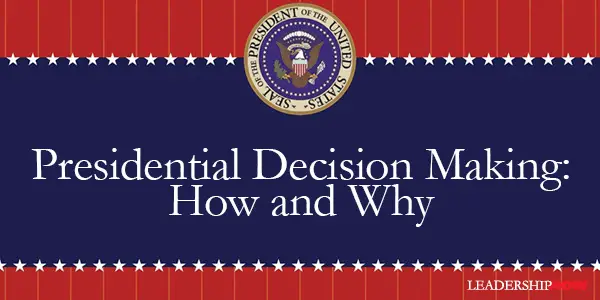 |
 |
04.29.11

Presidential Decision Making: How and Why
BOB WOODWARD once wrote, "When you see how the President makes political or policy decisions, you see who he is. The essence of the Presidency is decision-making." Nick Ragone has selected 15 presidential decisions that were proactive and ultimately shaped the office and the country. In the process he reveals more of the man.Looking back on decisions made, we often evaluate them based on our biases and current sensibilities. But to truly understand them we must see the world as they saw it. That is what Ragone does in Presidential Leadership. He takes each of these decisions and recreates them from the president’s perspective. It makes for an engaging and thought-provoking read. All of the decisions he selected were controversial at the time and required courage to see them through. The thread that runs through them all is persistence and conviction. Often in these decisions, the president had to make a choice between the good of the Union and his own personal beliefs. While many more decisions are worthy of consideration, he chose to focus on:
In reliving these moments in the pages of this book, you will gain a new appreciation for what it took to bring them about, their consequences and the origins of some of the issues we face today. Some of the decisions made were certainly a product of their time. What president today would deal with a tax revolt by personally leading 13,000 troops around the country in a show of force to intimidate the protesters as Washington did with the Whiskey Rebellion? But it proved to be the right thing to do. There was no bloodshed. “It was a rather anticlimactic ending to what many historians consider the greatest constitutional threat prior to the Civil War. Then there is the colorful account of Andrew Jackson’s handling of the nullification crisis brought on by the Tariff Act of 1832. The Union was at stake. “Jackson,” writes Ragone, “had the perfect skills for the crisis, if not the demeanor. He was ruthlessly consistent with his rationale….He understood the importance of public support and was adept at rousing patriotism through his words and deeds. He wasn’t afraid to be forceful when necessary, yet he tempered his natural impulsiveness because he knew it wouldn’t serve him well. And he had the capacity to grow and learn, something that can’t be said for every holder of the office.” His convictions no doubt guided Lincoln three decades later. Teddy Roosevelt’s approach to building the Panama Canal surely epitomizes the man. About his actions, Roosevelt said, “We would have a number of profound discussions, and they would still be going on now, and the Panama Canal would be in the dim future yet. We would have had a half century of discussion, and perhaps the Panama Canal. I preferred we should have the Panama Canal first and the half century of discussion afterword.” The well narrated history alone makes this a great read, but there are great leadership lessons to be found here as well. Reading through the accounts, it is easier to see how one decision would frame decisions and issues far into the future. Each decision creates a pattern of interaction that then influences thinking and behavior over time. Every decision creates an emergent system. Our decisions matter. What drove Harry Truman to fire Douglas MacArthur at the height of the Korean War? Did Gerald Ford know that his pardon of Richard Nixon could very well end his political career? Why did John F. Kennedy challenge America to reach for the moon? 
Posted by Michael McKinney at 11:28 AM
|
BUILD YOUR KNOWLEDGE
 

How to Do Your Start-Up Right STRAIGHT TALK FOR START-UPS 
Grow Your Leadership Skills NEW AND UPCOMING LEADERSHIP BOOKS 
Leadership Minute BITE-SIZE CONCEPTS YOU CAN CHEW ON 
Classic Leadership Books BOOKS TO READ BEFORE YOU LEAD |